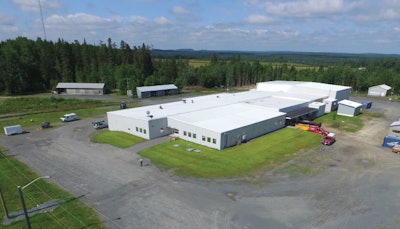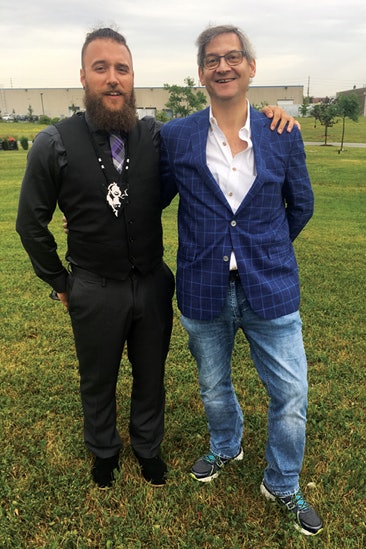
The growth of the North American cannabis industry ripples through communities across borders, but often overlooked are the tribal bands and their unique position within North America. With sovereign control and special relationships with federal government, tribal communities can offer companies and investors opportunities that are difficult to find elsewhere.
First Nation tribes, largely those situated throughout Canada, are beginning to show interest in entering the burgeoning marketplace.
“You’ve got a land base. You’d have a partner who has tax advantages,” says Shawn O’Connor, general manager of Homalco Wildlife Tours, who is currently developing branding for Homalco First Nation’s medical cannabis operation in Blue Inlet, British Columbia. “You would have a partner who also has some form of political capital in Canada,” O’Connor says.
Ontario-based Pontiac Group, led by managing partners Jacob Taylor and Jonathan Araujo, helps facilitate partnerships between native bands and established brands in the cannabis space, helping native groups find their niche in the rapidly developing industry.
“Companies are looking to become unique in this space,” Araujo says. “And that’s what will make us unique in the world, is having this plant tied to First Nation culture and First Nation spirituality.”
Pontiac Group helped coordinate the partnership between the Wahgoshig tribal community and DelShen Therapeutics Corp., a medical marijuana licensed producer in Canada. According to the Pontiac Group, 13 communities are now involved in medical cannabis, and it anticipates more than 40 First Nations bands joining together for mutual benefit. Taylor noted that the cannabis industry offers a chance for individual tribes to work together to take advantage of a promising industry.
“It’s very rare that First Nations get on board with new things as they come into Canada,” Taylor says. “And it’s even rarer that they come on board as a collective.”
On the corporate side, companies partnering with tribal bands would not only be able to benefit from tax advantages, branding opportunities and lower energy costs, but also directly impact the communities. Martin Shefsky, executive director at DelShen, convinced the company’s board to take an active role in corporate social responsibility, citing it as the key in working with First Nations.

“We wanted to give back, we wanted them to participate, we wanted them to share in the economic benefits,” Shefsky says. “It’s a material differentiator.”
That difference is something Pontiac Group and O’Connor see as the driving force in tribes participating in cannabis: the opportunity to build up tribal communities with jobs, infrastructure and better health resources. The potential source of revenue has caught the eye of tribes across borders.
In Santa Ysabel, Calif. (San Diego County), the Iipay Nation, over the past few years, has permitted medical cannabis, converted its defunct casino’s 35,000-square-foot gambling hall into a cannabis grow facility and developed a cannabis regulatory agency in an effort to create a solid framework for cannabis enterprises. Despite the generally conservative demographic, the general membership of the tribe supports the decision to develop medical cannabis to better the community.
“The money will be going to things like road improvements, building improvements, government infrastructure improvements, job training,” says Dave Vialpando, executive director of the Santa Ysabel Cannabis Regulatory Agency. “The tribe is looking to invest those revenues in providing for the tribe’s self-sufficiency and self-determination, which goes along with the tribal nation’s sovereign responsibility as a right.”
Job creation is another motivator for tribes that often deal with high unemployment. O’Connor sees 30 to 40 more jobs being created for Homalco First Nation once he and Chief Mary Ann Enevoldsen set up the production license for their cannabis operation.
“The youth like the idea of working in the cannabis industry,” O’Connor says. “Whether it’s in sales or growing, or related skill trades that would be involved, like electricians or plumbers or botanists.”
Perhaps the most important benefit for tribal communities is cannabis use as a harm-reduction strategy. Bands have notoriously struggled with abuse of tobacco, alcohol and opiates. Pro-cannabis supporters involved with these tribes hope to continue changing the historic perception of cannabis from negative to positive as a big step toward more tribal involvement. Canada’s Thunderbird Partnership Foundation, which works with the First Nation and Inuit communities to help address substance abuse and addiction, views consumption of cannabis as a way to curb the detrimental use of these other substances.
“This is a plant that was given to us by planet Earth, and we’ve known of its health applications,” Araujo says. “We don’t know the science behind it per se, but now the Western world is really getting on to the science behind it, and we’re excited to be a part of this movement.”

Canadian Context
As for what the rules and regulations for recreational cannabis will be in Canada, that remains a mystery, and the anticipation is creating confusion.
“The problem is a lot of the rules and regulations are moving targets. So no one knows what they are going to be,” Shefsky says. So instead of waiting on government to set the terms, Shefsky is prompting industry leaders to offer training programs that will acclimate potential producers to Canadian cannabis.
According to Shefsky, education is paramount because a cannabis boom, which professionals expect after legalization, will open the door to major vulnerabilities.
“If another 50 facilities are built and operated, you’re going to have the potential for a high failure rate,” Shefsky says, noting that a lack of human capital could be the demise of would-be cannabis businesses.
Cannabis outside medicinal is still illegal, but the currently proposed Cannabis Act could make recreational cannabis legal by July 2018. This would make Canada the first industrialized nation in the world to legalize recreational cannabis.
Business for recreational cannabis could prove successful based on data provided by the Canadian Justice Department. According to the Government of Canada, licensed producers of medicinal marijuana have been growing steadily year-to-year. There are currently 50 licensed producers in Canada, according to government data.
For First Nations to reap some benefit from this growing industry, government representation will be key.
Pontiac Group is adamant about keeping First Nation representation in government as the tides roll toward total legalization, especially for the safety of First Nations. That means incentivizing both parties to meet.
“There needs to be input from First Nation peoples in this land,” Araujo says. “If they don’t do that, we’re going to have the same issue as we do with tobacco, where community members are just going to set up shop anyways, and they’re going to do it the illegal way because they were never consulted with.”
Bridging the Culture Gap
Drawing a bridge between tribal culture and the modern, westernized business world is the major service Pontiac Group provides. Both Araujo and Taylor explained that there are many differences in perception in how deal-making works between these two, often-clashing worlds.
“It is in our culture that we take our time to really come up with much thought about an answer,” Araujo says. “And when you’re in a corporate meeting or business meeting with people and they’re asking a question to a native party or a native audience, and they don’t get that two-second response, they often start to freak out, and Jacob and I have seen this in many business meetings where they become uncomfortable.”
While Western business people can struggle with the slower pace of First Nations, tribal people grow frustrated with Canada making decisions on land that tribal people consider to be their territory, the Pontiac Group members say. Both Araujo and Taylor realized they needed to better educate indigenous people about non-tribal business customs.

“A lack of understanding [from Tribes] has been apparent,” Taylor says. “And we’ve really been on an educational process ourselves over the past few years in working with communities on this subject.”
Sean O’Connor says that it is important to understand that native bands are governments unto themselves. But there is overlap between both sides when it comes to stigmas surrounding cannabis.
“The brainwashing of the past against cannabis looms large and [over] the older segment of the population,” O’Connor says. “It takes time to sort through and consult and discuss like any governing body would to make sure you are representing the interest of the people.”
Large sums of money are essential for tribal communities to build the infrastructure necessary to build a business, one that can help update roads, provide jobs and offer medicinal cannabis. But for companies interested in partnering with tribal people, Shefsky suggests learning about tribal needs, desires and problems before going in.
Often, the deeper need from the tribes when considering business ties with the corporate world is respect.
“What we look for is what we call a VCR, they have to have a vision, the capacity and the respect for the First Nation,” O’Connor says.
U.S. Relations— Playing It Safe
Laws exist to respect sovereign, tribal lands, many of which are on both sides of the border. For example, the American Indian Religious Freedom Act allows for peyote, listed alongside cannabis as a Schedule I drug, and other products to be transported across the border for ceremonial purposes.
“We have contacts in Washington state as well, and trade between First Nations is a growing sector of economic activity both in Canada and the U.S.,” O’Connor says.
But taking cannabis across the Canadian border still poses the threat of serious jail time. Even if the current Cannabis Act were to be passed, the penalty for crossing the border could mean up to 14 years in prison for Canadians.
When it comes to considering doing business across the border, Shefsky says the United States is in the back of DelShen’s mind, but the group will wait until the regulatory framework is more favorable.
Despite a 2014 Justice Department ruling stopping attorneys from prosecuting tribes that cultivate cannabis on tribal land, a 2015 project for a cannabis resort in South Dakota was stopped after federal authorities threatened raids. The consultant working on the project at the time, Eric Hagen, was arrested and charged with conspiracy to possess, possession and attempted possession of more than 10 pounds of cannabis. He was cleared of all charges in late May 2017, according to the Sioux Falls Argus Leader.
Another native band, this one in California, also had its cultivation operation raided in 2015. The Pinoleville Pomo Nation had 400 plants and an extraction lab raided and eradicated in September 2015, according to the Ukiah Daily Journal.
Despite short-term prospects for exports looking dim as the U.S. federal government could roll back some of the cannabis industry’s protections (most notably the Rohrabacher-Farr Amendment), Canada could still play a major, global role. Both Pontiac Group and Delshen believe that Canada will be looked at from around the world as a leader in expanding cannabis into a nationwide industry—an industry that can uplift tribal communities.
















